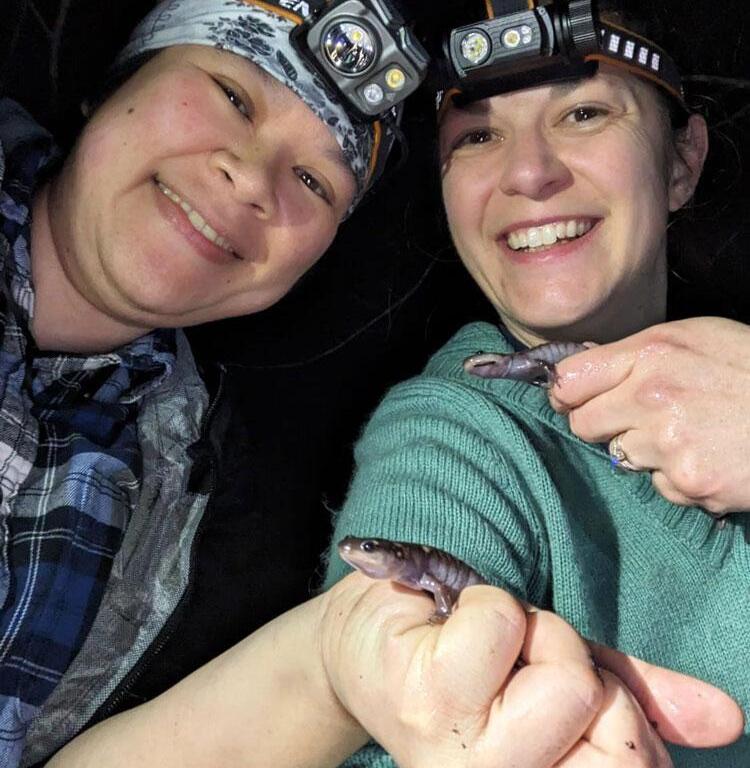Jonesboro, AR – (Contributed) – Arkansas State University has received a $605,140 grant from the Institute of Museum and Library Services (IMLS) as part of the 2025 National Leadership Grants to study the immunology of reptiles by leveraging the extensive living animal collections at zoos.
Dr. Lori Neuman-Lee, the principal investigator for the grant, is an associate professor of physiology in the Department of Biological Sciences. For this grant, she said they are partnering with numerous zoos across the country, including the Memphis Zoo, where co-principal investigator Dr. Sinlan Poo is curator of research.
“The ongoing collaboration between Dr. Neuman-Lee and Dr. Poo has benefited numerous graduate and undergraduate students by providing opportunities in zoological research,” said Dr. Jennifer Bouldin, dean of the Beck College of Sciences and Mathematics.
“I am thrilled to be working on this very understudied topic and collaborating with zoos across the country to do it,” said Neuman-Lee.
The grant will allow A-State researchers to create the National Reptilian Immunology Database, which, according to grant documents, will cross disciplines, connect zoological institutions, and address the conservation crisis impacting reptiles across the world.
Neuman-Lee said the grant will allow them to gather immunological data from reptiles housed in all the partnering zoos.
“We are hoping for over a hundred species — from tortoises and turtles, to crocodilians, to snakes and lizards. To get this project started, we received a generous donation from a donor at the Memphis Zoo that funded an A-State student. That student sampled 109 different animals from about 60 different species.”
The pilot program was conducted at the Memphis Zoo in 2023. Poo, who also works as adjunct research faculty at A-State, said, “The initial data collection was a proof of concept and laid the foundation for this large project.”
The team will work with nine zoos, including the Audubon Nature Institute, Brookfield Zoo in Chicago, Dallas Zoo, Little Rock Zoo, Memphis Zoo, Oklahoma Zoo, Philadelphia Zoo, Virginia Zoo, and Zoo Atlanta.
“One element of this work that is so exciting is the A-State research partnership with the nine zoos across the country,” said Dr. Travis Marsico, vice provost for research, innovation, and discovery at A-State. “Neuman-Lee and her team put together a stellar proposal, and I am thrilled about the research and student training opportunities provided by this funding.”
Neuman-Lee said this project will help build leadership and research capacity across the different zoos.
“In connecting researchers, veterinary staff, zookeepers, and outreach teams, we hope to help foster collaborations that will enhance the careers of these individuals,” Neuman-Lee continued. “In addition to creating networks among people, we will be establishing a database that is accessible to researchers and zoological staff with a public-facing aspect. Our knowledge of reptilian immunity will be dramatically increased by casting such a wide net across different species in these different institutions.”
The network they create will be trained in reptilian immunology.
“Reptiles are really exceptional organisms that have survived for millions of years. Their immune systems have a lot of similarities to ours, but some key differences merit examination,” she added.
Neuman-Lee said humans and wildlife are facing many new immunological challenges.
“Diseases are spreading at a faster rate, and novel diseases are becoming increasingly problematic as our world shrinks. Understanding the components of the reptilian immune system may help us uncover novel treatments and strategies for humans, captive animals, and wildlife.”
Neuman-Lee said the IMLS National Leadership Grant for Museums is specifically designed to build future leaders. Through this grant funding, they can train and support upcoming leaders and enhance the scientific capacity at museums and zoos.
“The close collaboration between A-State and Memphis Zoo has already resulted in several peer-reviewed publications, and this grant will allow additional A-State students to be involved with careers and activities at zoos by working directly with zookeepers, veterinary staff, and outreach teams,” Bouldin added.
As many people across the country have reptiles as pets, another part of their goal is scientific communication and outreach.
“Outreach teams at zoos and at A-State will be involved in this research. There will also be a digital ‘immunological zoo’ that will feature reptiles and their immune capabilities from different zoos,” Neuman-Lee concluded.
While the grant covers three years, they hope to continue the work long-term.


